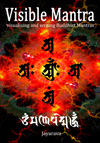Seed syllables (Sanskrit bījākṣara) are the quintessence of mantra, and the ultimate condensation of the Dharma, containing infinite meaning in a single syllable. Oṃ has held a special place in Indian religion since before Buddhism. Other seed syllables were elaborations of the first letter of a deity's name elaborated with the anusvāra and/or the visarga. In Buddhist tantra the Buddhas and Bodhisattvas are each associated with a seed syllable. I've included some seed words which are more than one syllable, but which function in a similar way to seed syllables.
If the seed syllable you are looking for is not in this list, try the figure that it is associated with. For instance loṃ doesn't have a separate page, but there are examples on the Locana page.
a | āḥ | dhīḥ | hrīḥ | hūṃ | maiṃ | oṃ | stryi | tāṃ | traṃ | phaṭ | svāhā |
a

The mother of all written and spoken syllables. A is the seed syllable for Mahāvairocana.
- examples of a in various scripts - includes ā, and āḥ
- Instructions on how to write a
āḥ
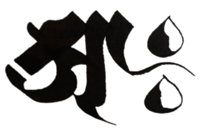
āḥ is the seed syllable of Amoghasiddhi. It also occurs in the combination oṃ āḥ hūṃ.
- Examples of āḥ including oṃ āḥ hūṃ
dhīḥ
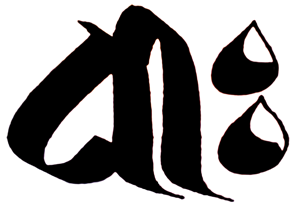
dhīḥ is the seed syallable of perfect wisdom. It is associated with Mañjughoṣa & Mañjuśrī and also with Prajñāpāramita.
- Examples of dhīḥ
- see also my essay The Seed Syllable of Perfect Wisdom.
hūṃ
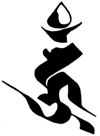
hūṃ is frequently the last syllable of a mantra. It is particularly associated with Akṣobhya, Vajrapaṇi, and with Vajrasattva.
- Examples of hūṃ
- How to write the hūṃ seed syllable in Siddhaṃ.
- oṃ āḥ hūṃ is included under āḥ
hrīḥ
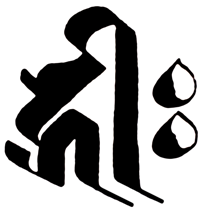
hrīḥ is the seed syllable of Amitabha.
- Examples of hrīḥ
- For more information on hrīḥ see also my essay The Seed Syllable of Great Compassion
maiṃ

maiṃ (rhymes with sign) is the seed syllable of Maitreya. This syllable can be written in two different ways in Siddhaṃ.
oṃ

Oṃ begins many mantras.
- Examples of oṃ
- oṃ āḥ hūṃ is included under āḥ
tāṃ

tāṃ is the seed syllable of both Green Tārā and White Tārā. Tārā is known in Tibet as the mother of all the Buddhas.
There is an interesting relationship between the body of White Tārā, and the form of the tāṃ in the Siddhaṃ script which you can read about on White Tara, tāṃ, and the Mandala.
traṃ
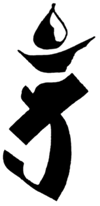
traṃ is the seed syllable of Ratnasambhava.
Bija words
These are words which do not quite fit the definition of being a seed syllable, but which function in more or less the same way.
svāhā
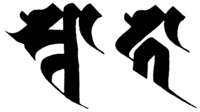
svāhā comes from Vedic ritual is used on the end of Buddhist mantras
phaṭ
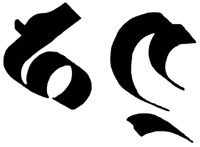
phaṭ is a very ancient Indian magical word.

